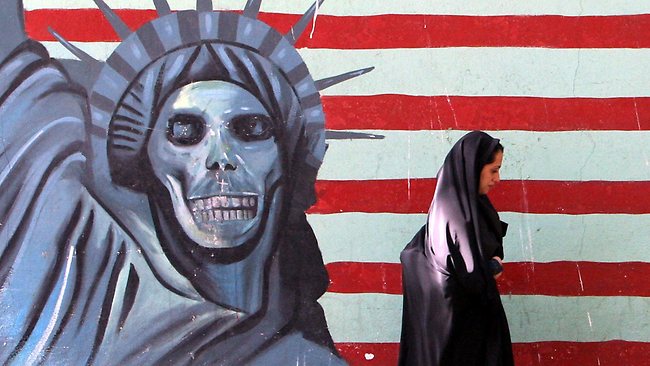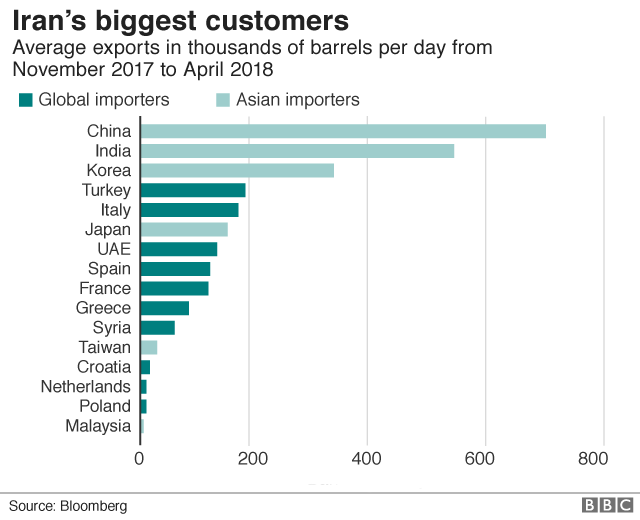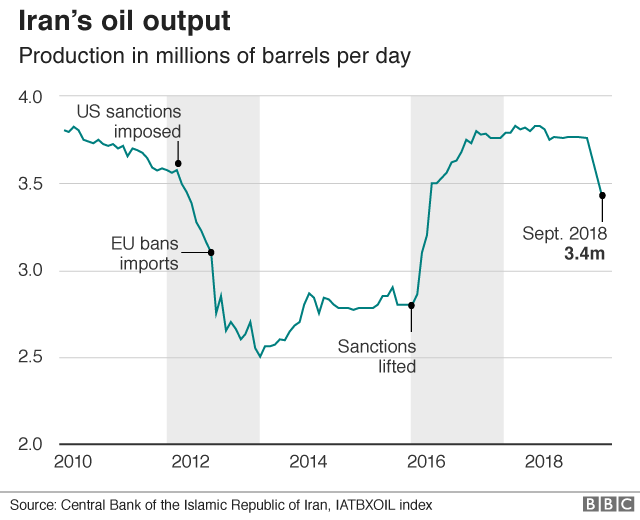On November 5, 2018, the United States fully re-imposed the sanctions on Iran that had been lifted or waived under the JCPOA. These are the toughest U.S. sanctions ever imposed on Iran, and will target critical sectors of Iran’s economy, such as the energy, shipping and shipbuilding, and financial sectors. The United States is engaged in a campaign of maximum financial pressure on the Iranian regime and intends to enforce aggressively these sanctions that have come back into effect. Extract from the US Department of the Treasury official website

The US sanctions on Iran are definitely nothing new but the ones imposed on the 5th of November are by far the most significant. Following the first tranche that came into force on 7 August, the Trump Administration has launched the second round in November, targeting mainly the oil exports – always at the top of the list, insurance services, banks and shipping companies. A large part of these punitive measures are the so-called “secondary sanctions” which, differently to the “primary sanctions” imposed on the country itself, are addressed to individuals, organizations and countries that do business with Iran.
Two EU Members, Greece and Italy, together with Taiwan, India, Japan, Turkey, China and South Korea are the only countries allowed to buy oil and gas from Iran for an initial period of time of 180 days. This breathing space for Tehran has nothing to do with an American benevolence, instead, the waivers have been granted because those countries agreed to “greatly reduced” the imports of Iranian oil and because an immediate stop of the purchases would destabilize worldwide oil prices. “We expect to issue some temporary allotments to eight jurisdictions, but only because they have demonstrated significant reductions in their crude oil and cooperation on many other fronts and have made important moves towards getting to zero crude oil importation”, said Mr. Pompeo in a conference call. As the chart below depicts, this group of eight countries that have been given the rare exemptions comprises the major trading partners for Tehran and India and China are the two biggest purchasers of Iranian crude. All the other countries of the world are cut off from the oil and gas market of Iran.

hSince the White House has started imposing sanctions, approximately 200 Iranian individuals and companies have been targeted, but after the 5th of November, 700 names have been added to the list.
Despite the EU is trying to mitigate the sanctions’ impact by keeping trading and investing in Iran, major international companies such as Peugeot, Allianz, Airbus and Total are leaving the country in order to avoid the risk of any American pressure. The US Secretary of State Pompeo has foreseen that more than 100 big companies will soon leave Iran. Germany, France and Great Britain have raised their voice, promising to help European companies doing their business with Tehran through an alternative payment mechanism, the Special Purpose Vehicle, that will guarantee to avoid US penalties.
Whilst the European Union seeks to preserve the Iranian nuclear deal after the US withdrawal in May, Teheran is trying to adopt new strategies against the “toughest ever” sanctions. In order to counter US embargoes, the Islamic Republic has, for instance, experienced the application of significant discounts on oil exports, which represent 80% of Iran’s revenue, and seaborne oil smuggling. However, these moves cannot guarantee a long-term success, especially at a time when the financial mismanagement has led the Iranian currency losing 70% of its value, the inflation has taken off and the oil exports have impressively dropped by several hundred thousand barrels per day.

The US Administration has outlined demands that would be unlikely met by the Islamic government. Among all, Trump wants Teheran to negotiate the nuclear deal to permanently prevent the country to develop nuclear weapons and to stop supporting and funding malign activities and extremist groups in the Middle East. But many experts have assumed that American punitive measures could even have the aim of triggering a regime change in Iran. “I am very confident that the sanctions that will be re-imposed this Monday, not only the crude oil sanctions…will have the intended effect to alter the Iranian regime’s behaviour. That’s our expectation. It’s the reason for President Trump’s policy”, asserted Mr. Pompeo.
The reaction was immediate. Thousands of Iranians took to the streets shouting “Death to America” against the fiscal pressure and to commemorate the 39th anniversary of the occupation of the US embassy in Teheran which occurred on 4 November 1979. Ayatollah Ali Khamenei has avowed that the US’s goal is to “re-establish the domination” over Iran it had before 1979, but “America has been defeated by the Islamic Republic over the past 40 years.” Iranian President Hassan Rouhani tries to reassure the citizens that Trump’s policy will not succeed in knocking out the economy, especially since the country has already suffered from multiple tranches of sanctions before. Nevertheless, it is clear that to survive Iran has to find creative ways to keep purchasing a reasonable level of oil and strengthen its relations with the major trading partners and the EU Members involved in the 2015 nuclear agreement.






